Business Law Assignment: Commercial Bank of Australia v Amadio Case
VerifiedAdded on 2022/11/17
|6
|1015
|109
Case Study
AI Summary
This case study analyzes the Commercial Bank of Australia v Amadio case (1983), focusing on the legal issue of unconscionable conduct. The case involves an elderly Italian couple, the Amadios, who acted as guarantors for their son's loan from the bank. The summary details the facts, including the Amadios' limited English proficiency and lack of awareness of the loan's details. It explores the issue of unconscionable conduct, where the bank allegedly took advantage of the Amadios' disadvantageous position. The case examines the decisions of Justice Mason and Justice Deane, who both found the bank's actions unconscionable. Justice Mason highlighted the bank's advantage over the Amadios due to their lack of understanding, while Justice Deane emphasized the bank's responsibility to ensure fairness. The case's legal reasons and the application of the concept of unconscionable conduct are discussed. The document includes a bibliography of relevant legal resources.

Business law
5 / 1 7 / 2 0 1 9
5 / 1 7 / 2 0 1 9
Paraphrase This Document
Need a fresh take? Get an instant paraphrase of this document with our AI Paraphraser
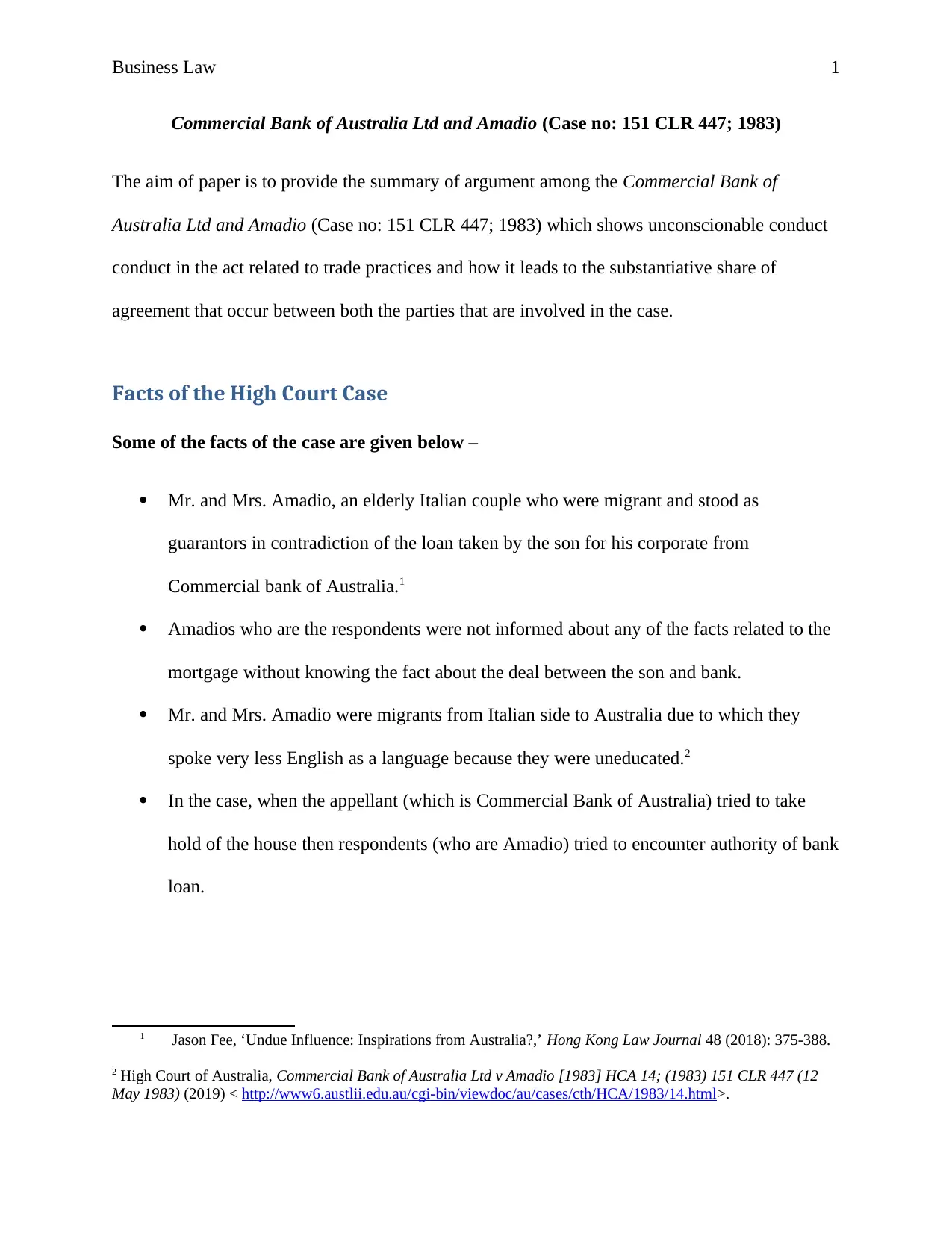
Business Law 1
Commercial Bank of Australia Ltd and Amadio (Case no: 151 CLR 447; 1983)
The aim of paper is to provide the summary of argument among the Commercial Bank of
Australia Ltd and Amadio (Case no: 151 CLR 447; 1983) which shows unconscionable conduct
conduct in the act related to trade practices and how it leads to the substantiative share of
agreement that occur between both the parties that are involved in the case.
Facts of the High Court Case
Some of the facts of the case are given below –
Mr. and Mrs. Amadio, an elderly Italian couple who were migrant and stood as
guarantors in contradiction of the loan taken by the son for his corporate from
Commercial bank of Australia.1
Amadios who are the respondents were not informed about any of the facts related to the
mortgage without knowing the fact about the deal between the son and bank.
Mr. and Mrs. Amadio were migrants from Italian side to Australia due to which they
spoke very less English as a language because they were uneducated.2
In the case, when the appellant (which is Commercial Bank of Australia) tried to take
hold of the house then respondents (who are Amadio) tried to encounter authority of bank
loan.
1 Jason Fee, ‘Undue Influence: Inspirations from Australia?,’ Hong Kong Law Journal 48 (2018): 375-388.
2 High Court of Australia, Commercial Bank of Australia Ltd v Amadio [1983] HCA 14; (1983) 151 CLR 447 (12
May 1983) (2019) < http://www6.austlii.edu.au/cgi-bin/viewdoc/au/cases/cth/HCA/1983/14.html>.
Commercial Bank of Australia Ltd and Amadio (Case no: 151 CLR 447; 1983)
The aim of paper is to provide the summary of argument among the Commercial Bank of
Australia Ltd and Amadio (Case no: 151 CLR 447; 1983) which shows unconscionable conduct
conduct in the act related to trade practices and how it leads to the substantiative share of
agreement that occur between both the parties that are involved in the case.
Facts of the High Court Case
Some of the facts of the case are given below –
Mr. and Mrs. Amadio, an elderly Italian couple who were migrant and stood as
guarantors in contradiction of the loan taken by the son for his corporate from
Commercial bank of Australia.1
Amadios who are the respondents were not informed about any of the facts related to the
mortgage without knowing the fact about the deal between the son and bank.
Mr. and Mrs. Amadio were migrants from Italian side to Australia due to which they
spoke very less English as a language because they were uneducated.2
In the case, when the appellant (which is Commercial Bank of Australia) tried to take
hold of the house then respondents (who are Amadio) tried to encounter authority of bank
loan.
1 Jason Fee, ‘Undue Influence: Inspirations from Australia?,’ Hong Kong Law Journal 48 (2018): 375-388.
2 High Court of Australia, Commercial Bank of Australia Ltd v Amadio [1983] HCA 14; (1983) 151 CLR 447 (12
May 1983) (2019) < http://www6.austlii.edu.au/cgi-bin/viewdoc/au/cases/cth/HCA/1983/14.html>.
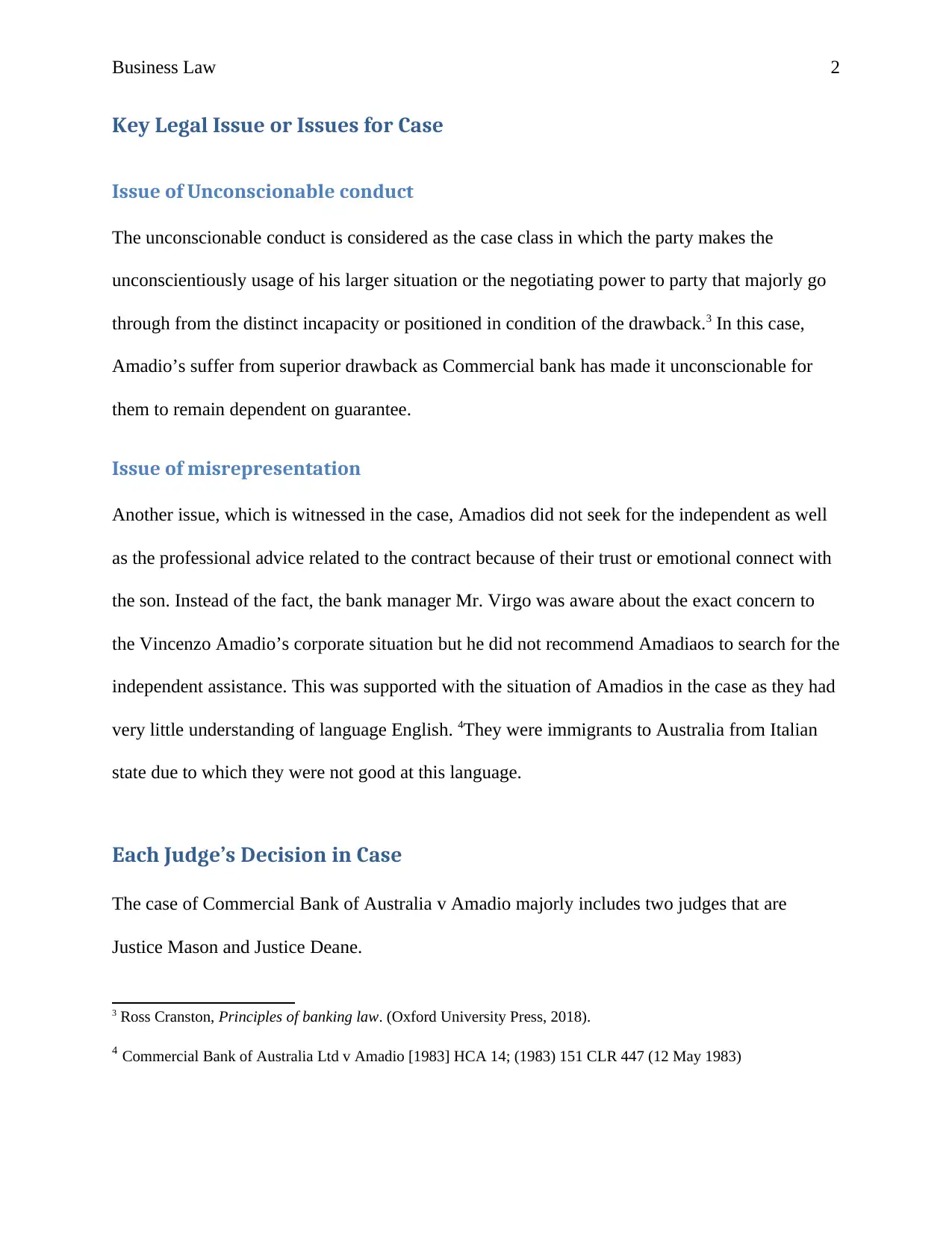
Business Law 2
Key Legal Issue or Issues for Case
Issue of Unconscionable conduct
The unconscionable conduct is considered as the case class in which the party makes the
unconscientiously usage of his larger situation or the negotiating power to party that majorly go
through from the distinct incapacity or positioned in condition of the drawback.3 In this case,
Amadio’s suffer from superior drawback as Commercial bank has made it unconscionable for
them to remain dependent on guarantee.
Issue of misrepresentation
Another issue, which is witnessed in the case, Amadios did not seek for the independent as well
as the professional advice related to the contract because of their trust or emotional connect with
the son. Instead of the fact, the bank manager Mr. Virgo was aware about the exact concern to
the Vincenzo Amadio’s corporate situation but he did not recommend Amadiaos to search for the
independent assistance. This was supported with the situation of Amadios in the case as they had
very little understanding of language English. 4They were immigrants to Australia from Italian
state due to which they were not good at this language.
Each Judge’s Decision in Case
The case of Commercial Bank of Australia v Amadio majorly includes two judges that are
Justice Mason and Justice Deane.
3 Ross Cranston, Principles of banking law. (Oxford University Press, 2018).
4 Commercial Bank of Australia Ltd v Amadio [1983] HCA 14; (1983) 151 CLR 447 (12 May 1983)
Key Legal Issue or Issues for Case
Issue of Unconscionable conduct
The unconscionable conduct is considered as the case class in which the party makes the
unconscientiously usage of his larger situation or the negotiating power to party that majorly go
through from the distinct incapacity or positioned in condition of the drawback.3 In this case,
Amadio’s suffer from superior drawback as Commercial bank has made it unconscionable for
them to remain dependent on guarantee.
Issue of misrepresentation
Another issue, which is witnessed in the case, Amadios did not seek for the independent as well
as the professional advice related to the contract because of their trust or emotional connect with
the son. Instead of the fact, the bank manager Mr. Virgo was aware about the exact concern to
the Vincenzo Amadio’s corporate situation but he did not recommend Amadiaos to search for the
independent assistance. This was supported with the situation of Amadios in the case as they had
very little understanding of language English. 4They were immigrants to Australia from Italian
state due to which they were not good at this language.
Each Judge’s Decision in Case
The case of Commercial Bank of Australia v Amadio majorly includes two judges that are
Justice Mason and Justice Deane.
3 Ross Cranston, Principles of banking law. (Oxford University Press, 2018).
4 Commercial Bank of Australia Ltd v Amadio [1983] HCA 14; (1983) 151 CLR 447 (12 May 1983)
⊘ This is a preview!⊘
Do you want full access?
Subscribe today to unlock all pages.

Trusted by 1+ million students worldwide
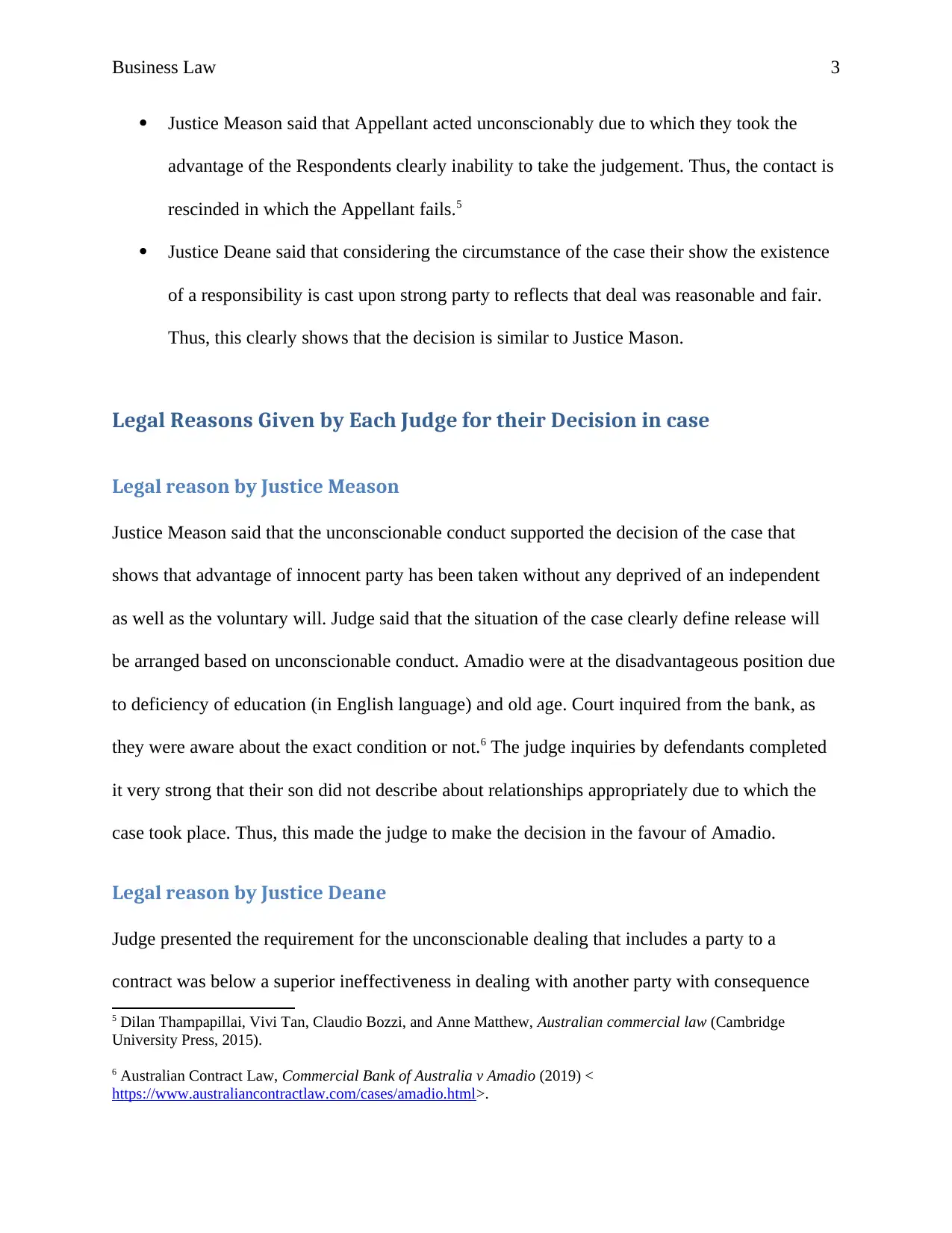
Business Law 3
Justice Meason said that Appellant acted unconscionably due to which they took the
advantage of the Respondents clearly inability to take the judgement. Thus, the contact is
rescinded in which the Appellant fails.5
Justice Deane said that considering the circumstance of the case their show the existence
of a responsibility is cast upon strong party to reflects that deal was reasonable and fair.
Thus, this clearly shows that the decision is similar to Justice Mason.
Legal Reasons Given by Each Judge for their Decision in case
Legal reason by Justice Meason
Justice Meason said that the unconscionable conduct supported the decision of the case that
shows that advantage of innocent party has been taken without any deprived of an independent
as well as the voluntary will. Judge said that the situation of the case clearly define release will
be arranged based on unconscionable conduct. Amadio were at the disadvantageous position due
to deficiency of education (in English language) and old age. Court inquired from the bank, as
they were aware about the exact condition or not.6 The judge inquiries by defendants completed
it very strong that their son did not describe about relationships appropriately due to which the
case took place. Thus, this made the judge to make the decision in the favour of Amadio.
Legal reason by Justice Deane
Judge presented the requirement for the unconscionable dealing that includes a party to a
contract was below a superior ineffectiveness in dealing with another party with consequence
5 Dilan Thampapillai, Vivi Tan, Claudio Bozzi, and Anne Matthew, Australian commercial law (Cambridge
University Press, 2015).
6 Australian Contract Law, Commercial Bank of Australia v Amadio (2019) <
https://www.australiancontractlaw.com/cases/amadio.html>.
Justice Meason said that Appellant acted unconscionably due to which they took the
advantage of the Respondents clearly inability to take the judgement. Thus, the contact is
rescinded in which the Appellant fails.5
Justice Deane said that considering the circumstance of the case their show the existence
of a responsibility is cast upon strong party to reflects that deal was reasonable and fair.
Thus, this clearly shows that the decision is similar to Justice Mason.
Legal Reasons Given by Each Judge for their Decision in case
Legal reason by Justice Meason
Justice Meason said that the unconscionable conduct supported the decision of the case that
shows that advantage of innocent party has been taken without any deprived of an independent
as well as the voluntary will. Judge said that the situation of the case clearly define release will
be arranged based on unconscionable conduct. Amadio were at the disadvantageous position due
to deficiency of education (in English language) and old age. Court inquired from the bank, as
they were aware about the exact condition or not.6 The judge inquiries by defendants completed
it very strong that their son did not describe about relationships appropriately due to which the
case took place. Thus, this made the judge to make the decision in the favour of Amadio.
Legal reason by Justice Deane
Judge presented the requirement for the unconscionable dealing that includes a party to a
contract was below a superior ineffectiveness in dealing with another party with consequence
5 Dilan Thampapillai, Vivi Tan, Claudio Bozzi, and Anne Matthew, Australian commercial law (Cambridge
University Press, 2015).
6 Australian Contract Law, Commercial Bank of Australia v Amadio (2019) <
https://www.australiancontractlaw.com/cases/amadio.html>.
Paraphrase This Document
Need a fresh take? Get an instant paraphrase of this document with our AI Paraphraser
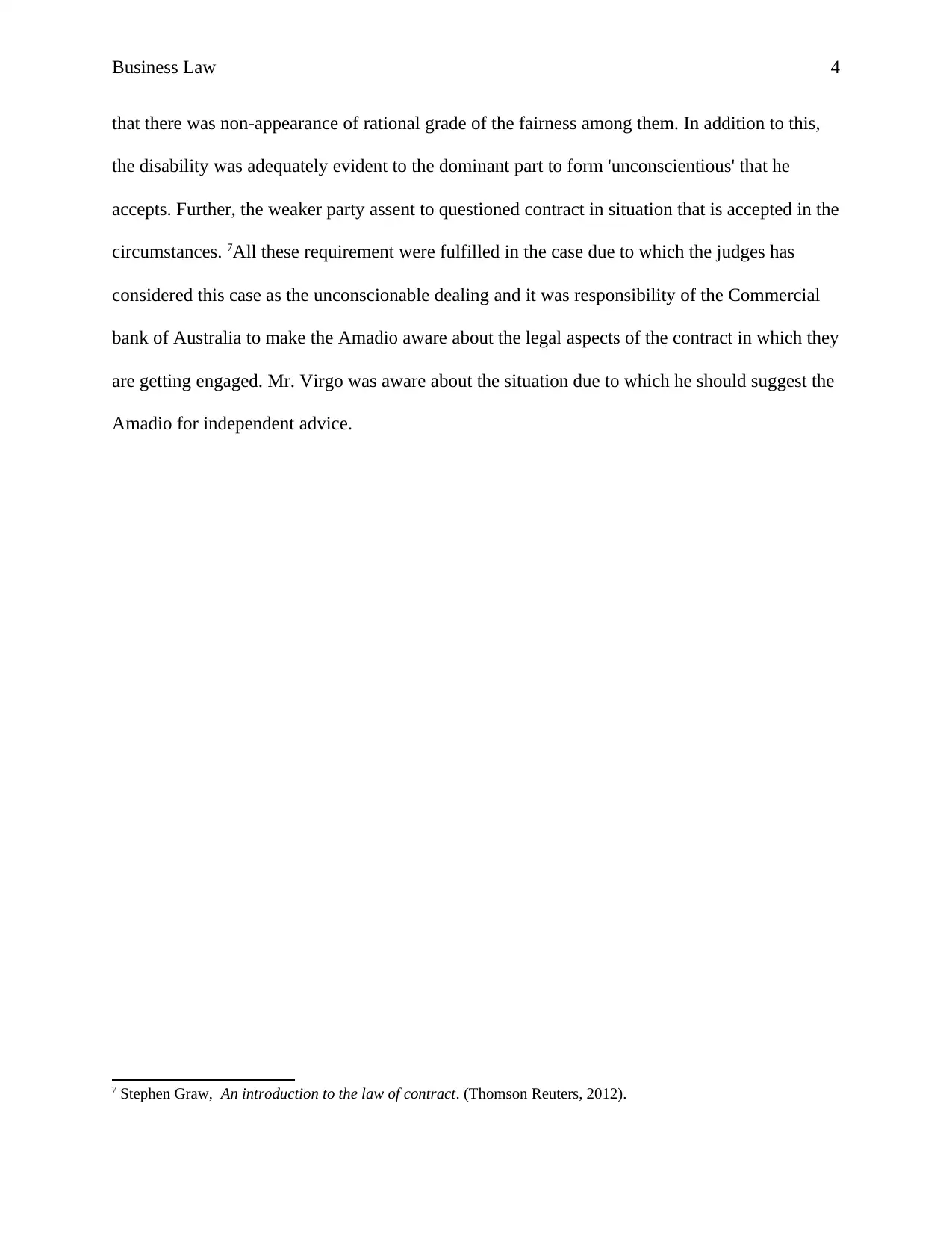
Business Law 4
that there was non-appearance of rational grade of the fairness among them. In addition to this,
the disability was adequately evident to the dominant part to form 'unconscientious' that he
accepts. Further, the weaker party assent to questioned contract in situation that is accepted in the
circumstances. 7All these requirement were fulfilled in the case due to which the judges has
considered this case as the unconscionable dealing and it was responsibility of the Commercial
bank of Australia to make the Amadio aware about the legal aspects of the contract in which they
are getting engaged. Mr. Virgo was aware about the situation due to which he should suggest the
Amadio for independent advice.
7 Stephen Graw, An introduction to the law of contract. (Thomson Reuters, 2012).
that there was non-appearance of rational grade of the fairness among them. In addition to this,
the disability was adequately evident to the dominant part to form 'unconscientious' that he
accepts. Further, the weaker party assent to questioned contract in situation that is accepted in the
circumstances. 7All these requirement were fulfilled in the case due to which the judges has
considered this case as the unconscionable dealing and it was responsibility of the Commercial
bank of Australia to make the Amadio aware about the legal aspects of the contract in which they
are getting engaged. Mr. Virgo was aware about the situation due to which he should suggest the
Amadio for independent advice.
7 Stephen Graw, An introduction to the law of contract. (Thomson Reuters, 2012).
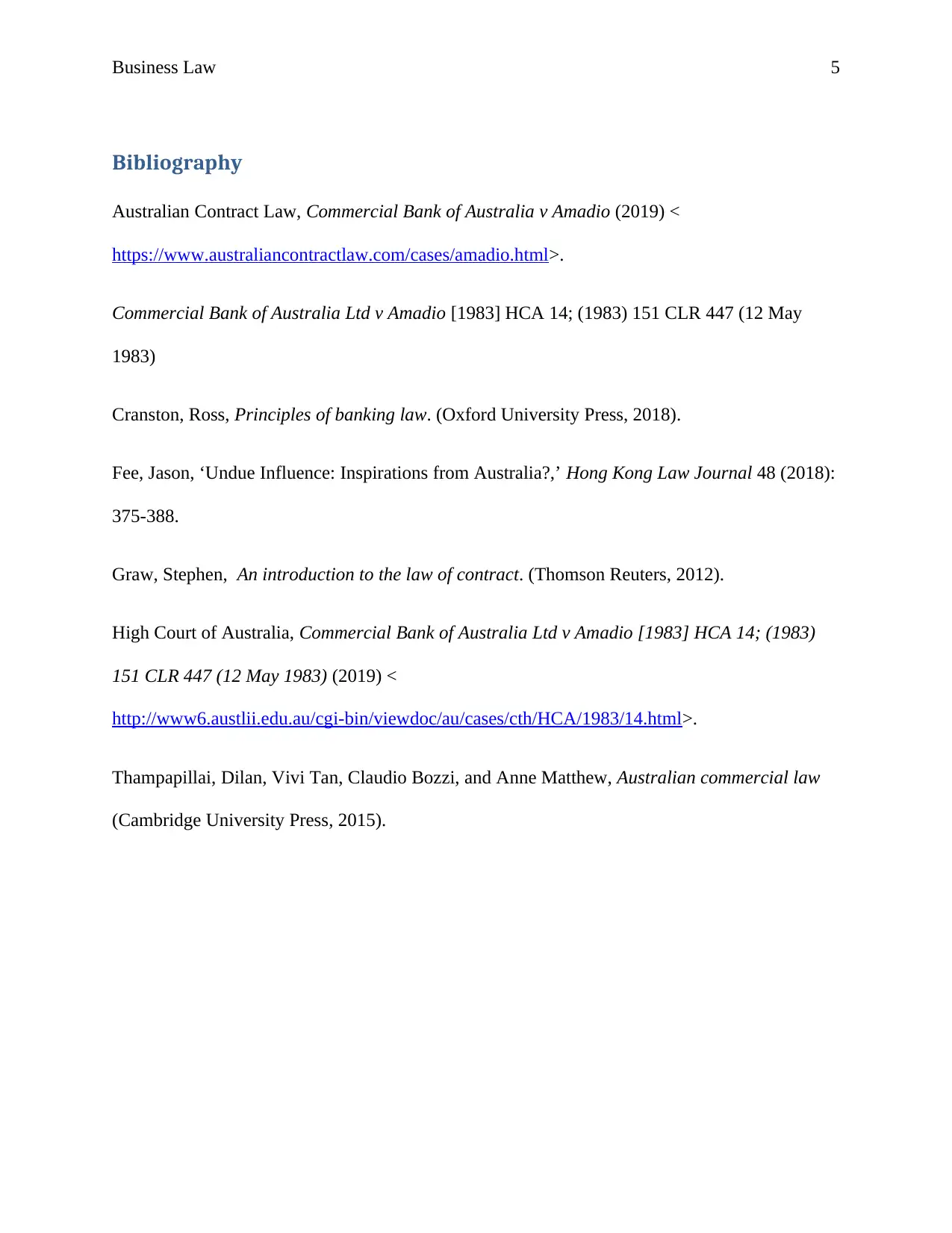
Business Law 5
Bibliography
Australian Contract Law, Commercial Bank of Australia v Amadio (2019) <
https://www.australiancontractlaw.com/cases/amadio.html>.
Commercial Bank of Australia Ltd v Amadio [1983] HCA 14; (1983) 151 CLR 447 (12 May
1983)
Cranston, Ross, Principles of banking law. (Oxford University Press, 2018).
Fee, Jason, ‘Undue Influence: Inspirations from Australia?,’ Hong Kong Law Journal 48 (2018):
375-388.
Graw, Stephen, An introduction to the law of contract. (Thomson Reuters, 2012).
High Court of Australia, Commercial Bank of Australia Ltd v Amadio [1983] HCA 14; (1983)
151 CLR 447 (12 May 1983) (2019) <
http://www6.austlii.edu.au/cgi-bin/viewdoc/au/cases/cth/HCA/1983/14.html>.
Thampapillai, Dilan, Vivi Tan, Claudio Bozzi, and Anne Matthew, Australian commercial law
(Cambridge University Press, 2015).
Bibliography
Australian Contract Law, Commercial Bank of Australia v Amadio (2019) <
https://www.australiancontractlaw.com/cases/amadio.html>.
Commercial Bank of Australia Ltd v Amadio [1983] HCA 14; (1983) 151 CLR 447 (12 May
1983)
Cranston, Ross, Principles of banking law. (Oxford University Press, 2018).
Fee, Jason, ‘Undue Influence: Inspirations from Australia?,’ Hong Kong Law Journal 48 (2018):
375-388.
Graw, Stephen, An introduction to the law of contract. (Thomson Reuters, 2012).
High Court of Australia, Commercial Bank of Australia Ltd v Amadio [1983] HCA 14; (1983)
151 CLR 447 (12 May 1983) (2019) <
http://www6.austlii.edu.au/cgi-bin/viewdoc/au/cases/cth/HCA/1983/14.html>.
Thampapillai, Dilan, Vivi Tan, Claudio Bozzi, and Anne Matthew, Australian commercial law
(Cambridge University Press, 2015).
⊘ This is a preview!⊘
Do you want full access?
Subscribe today to unlock all pages.

Trusted by 1+ million students worldwide
1 out of 6
Related Documents
Your All-in-One AI-Powered Toolkit for Academic Success.
+13062052269
info@desklib.com
Available 24*7 on WhatsApp / Email
![[object Object]](/_next/static/media/star-bottom.7253800d.svg)
Unlock your academic potential
Copyright © 2020–2026 A2Z Services. All Rights Reserved. Developed and managed by ZUCOL.




